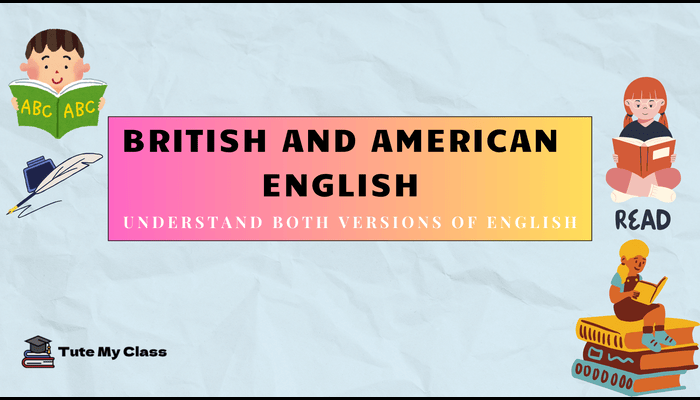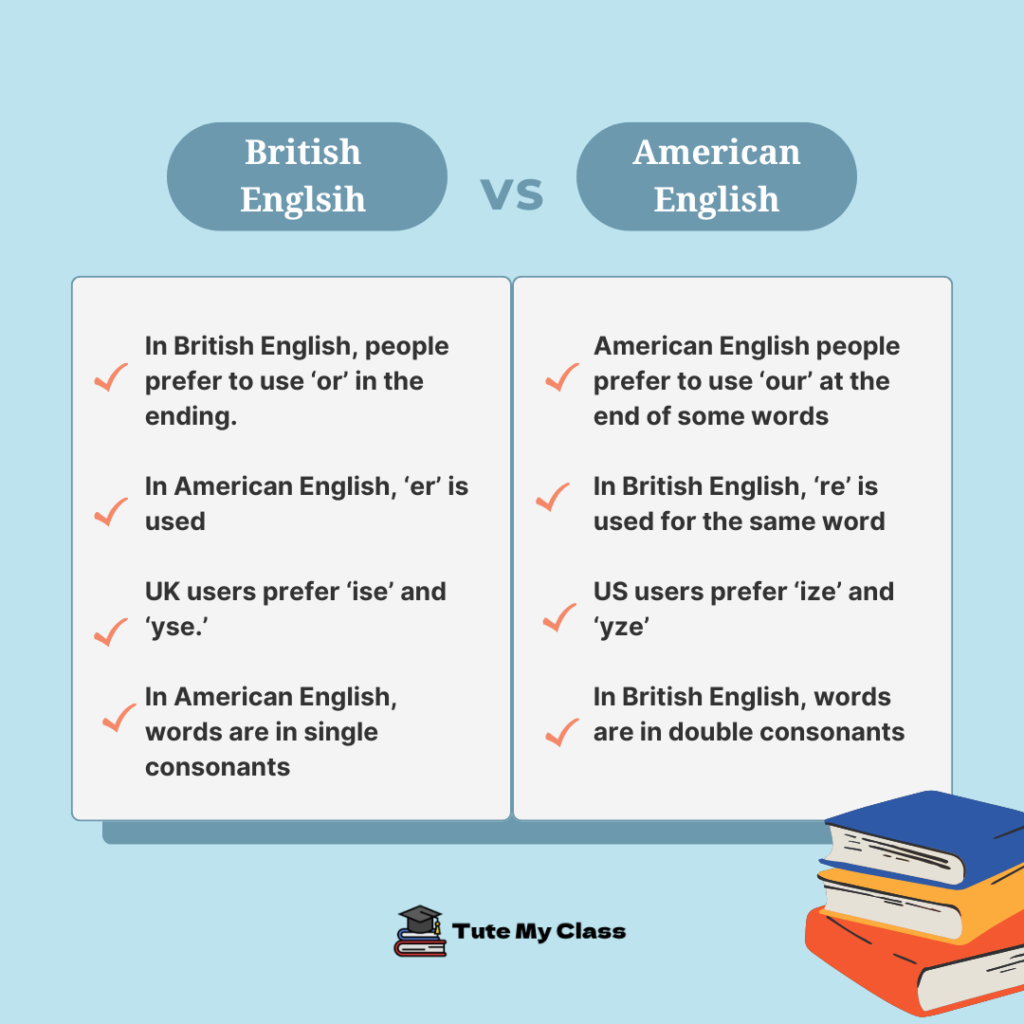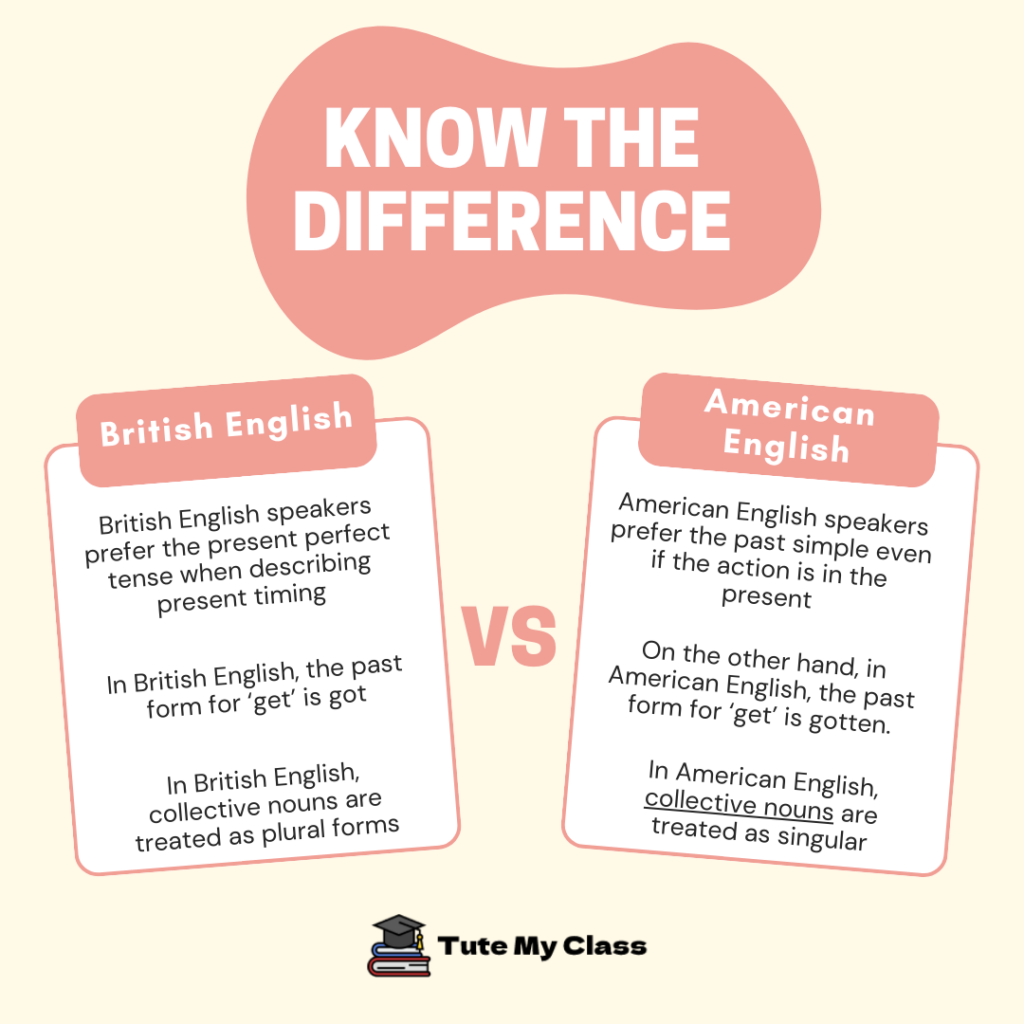
English is a language that is spoken in almost all countries. With nearly one billion speakers around the world, you can easily find English speakers around you. The fun fact is that we all speak English without knowing what type of English we speak. There are different types of English language variations. British English, American English, and Australian English are commonly used forms.
With different versions in English, students are often confused about which is best and which to use in academics. Learners with improper knowledge of spelling, punctuation, and word choice struggle to decide on the correct usage of words. We have curated this blog for those who don’t clearly understand British and American English and often find themselves wondering, can I pay someone to take my online class? Refer to this blog and learn grammar, pronunciation, and spelling differences in English. Proper knowledge will increase your chances of scoring good grades in your assignments and online classes.
British English vs American English: Spelling Differences
British English came into existence in the 16th century during the rule of the British Empire. Sooner, it became popular in Asia, Africa, and the Americas. On the other hand, if we talk about American English, it came into existence in the United States. However, it became popular after its wide usage in Hollywood movies and music.
The spelling, punctuation, grammar, verb conjugation, and word choice are the differences between the two versions of English. As a student, it is essential to understand the differences between British and American English, including their meanings and spellings. With proper knowledge, you can use the right words with the right spelling in all your assignments and research.
Here we have provided examples of words that look similar, have the same meaning, but have different meanings. To ensure you are correctly using American or British English, make sure you understand these differences in spelling in words.
American and British English Words with Spelling Differences

Students who don’t have English as their first language often get confused between words that have the same context with different spellings. One such example is ‘labor’ and ‘labour.’ Here, both words hold similar meanings, but the spelling is different. Single and double consonants are also spelling differences in British and American English, which students might get confused by. ‘Labeled’ and ‘labelled’ are popular examples that we all might have heard in our lives, but get confused about which one is correct and where to use it.
Here are some more examples with proper context to help you understand terms better.
our vs or
‘Our’ and ‘or are British and American English words that students often get confused with. In British English, people prefer to use ‘or’ in the ending. On the other hand, American English people prefer to use ‘our’ at the end of some words. Though the meaning is similar, the spelling is different. Refer to the words below to understand
- Behavior or behaviour
- Labor or labour
- Favor or favour
- Favorite or favourite
- Color or colour
- Honor or honour
- Neighbour or neighbor
Er vs re
Words ending with ‘er’ and ‘re’ are also a common British and American English spelling difference that confuses students. In American English, ‘er’ is used, while in British English, ‘re’ is used for the same word. Here are words that are pronounced the same but have different spellings.
- Center or centre
- Meter or metre
- Fiber or fibre
- Theater or theatre
- Caliber or calibre
- Kilometer or kilometre
- Saber or sibre
- Liter or litre
Ize/yse vs ise/yze
Here is another spelling difference in British and American English where students make mistakes in usage. US users prefer ‘ize’ and ‘yze,’ and UK users prefer ‘ise’ and ‘yse.’ However, there are a few terms where these suffixes are used in a flexible way. Have a look at the words ending with these terms.
- Organize or organise
- Realise or realize
- Recognise or recognize
- Analyse or analyze
- Catalyse or catalyze
- Paralyse or paralyze
- Apologise or apologize
- Authorise or authorize
- Organisation or organization
- Minimise or minimize
- Finalise or finalize
- Idolise or idolize
- Fantasise or fantasize
Single vs Double Consonant
Single and double consonants are also a major difference between British and American English. You must know where to add a single letter and where to add a double letter in a word. In American English, words are in single consonants, and in British English, words are in double consonants.
Have a look at some common examples for better understanding and proper usage.
- Travelled or traveled
- Travelling or traveling
- Cancelled or canceled
- Cancelling or canceling
- Labelled or labeled
- Labelling or labeling
- Fuelled or fueled
- Fuelling or fueling
- Modelling or modeling
- Buses or busses
- Focussed or focused
- Signalling or signaling
- Signalled or signaled
- Quarreling or quarelling
- Quarreled or quarreled
- Marvelled or marveled
- Marvelling or marveling
- Levelled or leveled
- Levelling or leveling
In today’s time, both versions of English are equally used in different parts of the world. However, things became difficult for international students. Both American and British English seem so similar that they get confused about which one to use and where. This confusion negatively impacts their ability to score well in their online English courses.
Students who don’t have English as their first language find themself in a dilemma, wondering, is it possible to pay someone to do my online English class for me as I want to improve my academic scores? If you are in a similar situation facing challenges to complete your online English classes, relying on online class helpers could be the smartest solution. Hiring online class takers is the easiest way to submit English assignments and English essays on time. The team of qualified and proficient English online class helpers will timely manage your online class. They will help you pass your English course with flying colors.
British English vs American English: Grammar Differences

English grammar is complicated. Students learning English often struggle to understand complex rules and irregular verbs. Understanding the grammar explanation of British and American English is even more difficult. Both versions of English follow certain grammatical rules that the learner struggles to understand.
Read the grammatical explanation below and learn how grammar is used in British and American English.
Past and Present Perfect Tense
British English speakers prefer the present perfect tense when describing present timing. American English speakers prefer the past simple even if the action is in the present.
Here are some examples of present perfect and past simple, and how they are used in British and American English.
- I’ve just finished writing my college essay – British English
- I just finished writing my college essay – American English
- Have you done your homework yet? British English
- Did you do your homework yet? American English
- He has broken his left leg – British English
- He broke his left leg – American English
Got vs Gotten
‘Get’ is a common word that we all might have used in our lives. However, in the past participle, the word is changed. In British English, the past form for ‘get’ is got. On the other hand, in American English, the past form for ‘get’ is gotten.
Here are some examples of the usage of ‘got’ and ‘gotten’ in sentence form.
- He has got used to the new schedule – British English
- He has gotten used to the new schedule – American English
- I have got my test results – British English
- I have gotten my test results – American English
- My appraisal has got delayed – British English
- My appraisal has gotten delayed – American English
Singular vs. Plural
How collective nouns are treated is also something that you must understand when learning British and American English. In American English, collective nouns are treated as singular. On the other hand, in British English, collective nouns are treated as plural forms.
Get a clear understanding of how groups of people are referred to in the US and UK with the following examples.
- The basketball team are playing very well – British English
- The basketball team is playing very well – American English
- The staff are working overtime – British English
- The staff is working overtime – American English
- The audience is clapping continuously – American English
- The audience are clapping continuously – British English
British English vs American English: Word Choice Difference
Here are some examples of common word choices used in the US and UK. These words hold the same meaning but have different spellings. Learners must know their meaning and how and where to use them. A wrong placement or wrong choice of words will change the entire meaning of the sentence.
- Elevator/lift
- First floor/ground floor
- Second floor/first floor
- Apartment/flat
- Period/full stop
- Biscuit/cookies
- Kindergarten/nursery
- Elementary school/primary school
- Middle school/secondary school
- Store/shop
- Mall/shopping centre
- Grocery store/supermarket
- Movie/file
- Cinema hall/theatre
- Soccer/football
- Eggplant/brinjal
- Chips/crisps
- Sidewalk/pavement
- Autumn/fall
- Garbage/rubbish
- Pants/trousers
- Corron candy/candyfloss
A clear understanding of the difference between British and American English is important for students, especially if they are pursuing a degree in psychology. Let me explain why this matters. Research, studies, and theories are an important part of psychology. Psychology students often refer to theories from famous psychologists for a better understanding of concepts. Popular psychology theories are written by American and British psychologists. What if you learn but don’t understand words, grammar, or punctuation? It would be a miserable situation, right? You can easily avoid any such situation for yourself. Make sure you understand the difference between British and American English. With proper knowledge, you can confidently learn and complete your assignments. Moreover, you may engage more fluently in international discussions.
Mastering both versions of English is important for better scoring in your academics. And if you ever struggle to understand these differences, scoring good in your psychology class might be difficult. In such a case, a simple query of can someone do my online psychology class for me would be a wise choice. You can connect with experts and ask them to manage your workload. Professional online class takers will closely look into your online course and make sure you score top grades.
Frequently Asked Questions
Question 1: Why are British and American English different?
Answer: Both American and British English have the same roots. The major reason why they are different is because to pronunciation shifts. American English absorbed words from Native American languages. British English retained the more traditional pronunciation.
Question 2: What is the difference between British English and American English?
Answer: The spelling, punctuation, grammar, verb conjugation, and word choice are the differences between the two versions of English.
